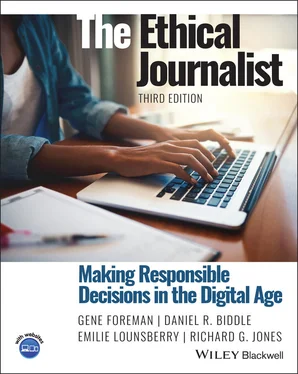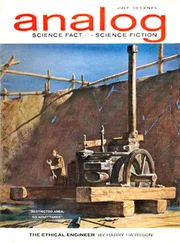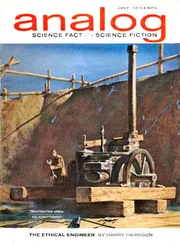Gene Foreman - The Ethical Journalist
Здесь есть возможность читать онлайн «Gene Foreman - The Ethical Journalist» — ознакомительный отрывок электронной книги совершенно бесплатно, а после прочтения отрывка купить полную версию. В некоторых случаях можно слушать аудио, скачать через торрент в формате fb2 и присутствует краткое содержание. Жанр: unrecognised, на английском языке. Описание произведения, (предисловие) а так же отзывы посетителей доступны на портале библиотеки ЛибКат.
- Название:The Ethical Journalist
- Автор:
- Жанр:
- Год:неизвестен
- ISBN:нет данных
- Рейтинг книги:5 / 5. Голосов: 1
-
Избранное:Добавить в избранное
- Отзывы:
-
Ваша оценка:
- 100
- 1
- 2
- 3
- 4
- 5
The Ethical Journalist: краткое содержание, описание и аннотация
Предлагаем к чтению аннотацию, описание, краткое содержание или предисловие (зависит от того, что написал сам автор книги «The Ethical Journalist»). Если вы не нашли необходимую информацию о книге — напишите в комментариях, мы постараемся отыскать её.
Praise for the Third Edition of The Ethical Journalist
ANN MARIE LIPINSKI,
Praise for the Earlier Editions
GENE ROBERTS,
ALICIA C. SHEPARD, The Ethical Journalist
The Ethical Journalist
The Ethical Journalist — читать онлайн ознакомительный отрывок
Ниже представлен текст книги, разбитый по страницам. Система сохранения места последней прочитанной страницы, позволяет с удобством читать онлайн бесплатно книгу «The Ethical Journalist», без необходимости каждый раз заново искать на чём Вы остановились. Поставьте закладку, и сможете в любой момент перейти на страницу, на которой закончили чтение.
Интервал:
Закладка:
A member of a society absorbs its ethical precepts through a process of socialization.
Our value system – based on the things we prize most – influences how we make moral choices.
An ethical dilemma demands such a moral choice: a person may have to violate one ethical principle to fulfill another.
3 The News Media’s Role in Society
The profession has matured and accepted social responsibility
Journalists generally agree that their fundamental ethical principles are to seek truth, serve the public, and maintain independence from the people they report on.
Journalism, like other professions and institutions, owes society a moral duty called social responsibility.
In the 1940s, the Hutchins Commission defined journalism’s social responsibility: to provide reliable information for the community.
An ethical awakening occurred in journalism during the decade beginning in the mid-1970s.
During this period of reform, many news organizations codified their principles, first addressing conflicts of interest and then refining news-coverage practices.
Today’s journalism reflects decades of rising professionalism, but the transition to the digital era presents new challenges.
Point of View: The Essential Pursuit of Truth ( Martin Baron )
Point of View: Decision-Making in the Digital Age ( James M. Naughton )
4 For Journalists, a Clash of Moral Duties
Responsibilities as professionals and as human beings can conflict
In the abstract, journalists should avoid becoming involved with the events and the people they cover.
However, certain situations require journalists to decide whether they should step out of their observer role and become participants.
In those situations, guidelines can help journalists reach sound decisions about whether to intervene.
Point of View: Journalists Are Humans, Too ( Halle Stockton )
Case Study: The Journalist as a Witness to Suffering
Case Study: Protester Is Beaten; Reporter Steps In
5 The Public and the Media: Love and Hate
The goal for the journalist should be respect, not popularity
Even as the news media mature and accept social responsibility, the public is increasingly hostile, and that is documented in surveys.
As a journalist, you should be aware of this hostility and the likely reasons for it.
You should treat the audience with respect and take complaints seriously; stripping away the rancor, you might find useful lessons.
The public’s hostility has to be put in perspective; it may not be as bad as it seems.
Point of View: Journalism, Seen From the Other Side ( Jane Shoemaker )
Case Study: A Journalist’s Trial by Social Media
6 How the “Trump Effect” Challenged Journalism
The news media had never dealt with a president like No. 45
As a candidate and president (2015 - 2021), Donald Trump vigorously tested journalism’s habits, tools, and tenets.
Modifying their reporting practices, journalists adapted to Trump much as earlier generations had adapted to Senator Joseph R. McCarthy. But the transition was not a smooth one.
To deal with a multitude of false statements, news organizations created fact-checking units and debated whether to use the word lie.
Coverage of Trump and his administration ranged from hard-hitting investigations to snarky commentary that tended to confirm critics allegations of bias.
Point of View: Impartial Journalism’s Enduring Value ( Thomas Kent )
7 Applying Four Classic Theories of Ethics
Ancient philosophy can be a factor in the decision-making process
The strengths and weaknesses of four classic ethical theories in the context of editor’s decisions to publish government secrets.
Rule-based thinking - doing the right thing, even if there are consequences.
Ends-based thinking - choosing to do what brings the most good to the most people.
The Golden Rule - treating other people the way you would want to be treated.
Aristotle’s Golden Mean - finding a moderate solution when the extremes won’t work.
The practice of journalism typically blends rule-based thinking and ends- based thinking.
8 Using a Code of Ethics as a Decision Tool
Written professional standards can be a valuable guide
Ethics codes in journalism trace their origins to the early twentieth century, as some editors put word-of-mouth standards into writing.
Codes adopted by professional associations of journalists are voluntary; codes adopted by news outlets for the direction of their staffs are enforceable.
Codes can be useful as a part of the decision process, not as a substitute for that process.
The Society of Professional Journalist’s 2014 revision of its code of ethics is a model for the profession. Its four guiding principles are: seek truth and report it, minimize harm, act independently, and be accountable and transparent.
9 Making Moral Decisions You Can Defend
How to apply critical thinking and a decision template
A careful decision-making process draws on the practical skills of journalism: gathering facts, analyzing them, and making judgments.
Critical thinking - thoughtful analysis - is an essential component of the decision process.
A step-by-step template can guide you to a better decision.
You must test your decision to see if it can be defended.
In this course, approach the case studies as a laboratory exercise in decision-making.
Point of View: Avoid These Rationalizations ( Michael Josephson )
Case Study: Deciding Whether to Identify a CIA Agent
Part II: Putting Journalism Ethics to Work
10 Getting the Facts Right and Being Fair
SPJ’s guiding principle of seeking truth and reporting it
Accuracy and fairness are journalism’s fundamental ethical values.
The digital era, with its emphasis on speed, entices reporters to take shortcuts and, thus, to risk mistakes.
Journalists have to be alert for hoaxes, especially on the web.
Problematic trends in the newsroom: less specialization, less editing.
Point of View: Declaring What You Wont Report ( Craig Silverman )
Case Study: A Story of Rape at Mr. Jefferson’s University
Case Study: A Double Disaster at the Sago Mine
Case Study: Richard Jewell: He Really Was a Hero
Case Study: The Football Star’s Fictitious Girlfriend
11 Showing Empathy for People in the News
SPJ’s guiding principle of minimizing harm
Recognizing that the truth can hurt, journalists should weigh the information they are reporting against the harm it can be expected to cause. Sometimes that calculation might lead to a decision not to publish a detail of marginal relevance or possibly an entire story or photograph.
Requests from the public to “unpublish” archival content create an ethical dilemma: a desire to protect the historical record versus consideration of the people hurt by that record, especially when it is flawed.
Reporters should take particular care when interviewing children and survivors of a tragedy, or when reporting on suicides.
Journalists should be aware that their presence can be viewed as intrusive.
Case Study: The Death of a Boy
Point of View: Reporting a Fact, Causing Harm ( William F. Woo )
12 Avoiding Conflicts: Appearances Count
SPJ’s guiding principle of acting independently
In an actual conflict of interest, journalists allow self‐interest, or a loyalty to any other person or organization, to take precedence over their duty to the audience.
Читать дальшеИнтервал:
Закладка:
Похожие книги на «The Ethical Journalist»
Представляем Вашему вниманию похожие книги на «The Ethical Journalist» списком для выбора. Мы отобрали схожую по названию и смыслу литературу в надежде предоставить читателям больше вариантов отыскать новые, интересные, ещё непрочитанные произведения.
Обсуждение, отзывы о книге «The Ethical Journalist» и просто собственные мнения читателей. Оставьте ваши комментарии, напишите, что Вы думаете о произведении, его смысле или главных героях. Укажите что конкретно понравилось, а что нет, и почему Вы так считаете.











